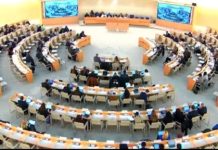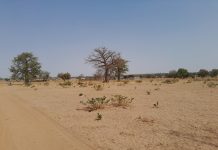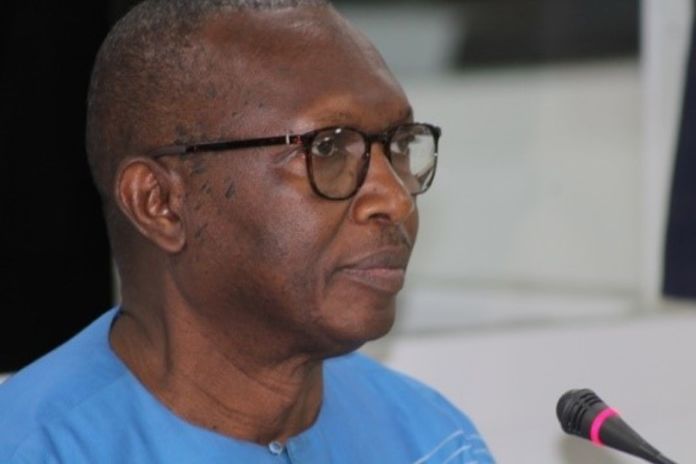By Yankuba Jallow
Professor Abdoulie Saine on Monday, 20th January 2020 said the 22nd July 1994 was caused by Jawara’s failure to step down.
Professor Saine appeared before the Truth, Reconciliation and Reparations Commission (TRRC) on Monday, 20th January 2020 to explain his research findings of the 22 – year authoritarian rule of ex-President Jammeh. Jammeh, an ex-military Captain together with 4 others who formed a military government in the Gambia from 1994 to 1996 after toppling the PPP government.
He said Jawara at the PPP Congress in Mansakonko told the people that he will step down.
“The failure of the PPP not selecting Sir Dawda’s successor and his failure of not stepping down was a mistake. The army stepped in to avert further decline of the economy,” he said.
Saine said this created two camps in his party wherein one group wanted him to stay while the other wanted him to honour his promise to step down.
“Finally he (ex-President Jawara) stayed which was a big mistake on his side,” he said.
On the PPP government, he said the division among the political folk also reflected in the army. He said there were different camps among the politicians after ex-President D.K. Jawara told the PPP supporters at their Congress in the early 90s that he is going to step down. He said this reflected in the army. He said the camps included B.B. Dabo’s camp, Saihou Sabally’s camp, “sembocracy” and “terri-kafo”.
He said people believed that elections alone cannot dislodge the then PPP government even though people were with the view that the government was corrupt. He said the government failed to pay soldiers who came from peacekeeping mission and this agitated mutinies by soldiers.
“The government (of the PPP) wasn’t doing enough. This contributed to the coup,” he said.
Saine first talked about the PPP government before talking about Jammeh and his misrule.
He said Yahya Jammeh and his colleagues were hungry for power and thus plotted the coup. The expert witness said at the time of the 22nd July military takeover, the Gambia was divided in terms of her social and economic formation.
“The coup was motivated primarily to make personal economic gains. They came from relatively poor communities, from low education and with low wages,” he said.
He said the condition within the army under Jawara was deplorable with little or no opportunities for soldiers to further their education.
“Their salaries were poor, the living conditions were poor – the conditions were generally poor,” he said.
He said the coup was not motivated by what the AFPRC was claiming including corruption allegation. Saine said the 22nd July coup was about hunger for power and not as claimed by the AFPRC members.
He said in fact after taking over, the AFPRC ministers were living in more flamboyant life than the PPP ministers used to live.
He said Jammeh was copying ex-autocratic President Jerry Rawlings’ style. He said the first 22nd July anniversary was attended by Rawlings as the guest and the first visit made by the AFPRC was to Ghana.
The 69 – year – old said after taking over, Jammeh and his colleagues wanted to entrench themselves in power and they did everything possible to remain in power.
He said after taking over in 1994, Jammeh and his colleague Council (AFPRC) members engineered the 1996 presidential elections, things were done in a way that made it favourable for him to contest. The 69 – year – old said the Armed Forces Provisional Ruling Council (AFPRC) appointed the members of the electoral commission (PIEC) and formulated a new constitution with favourable clauses to them. He said they enacted decrees to suppress the press and their political opponents. Professor Saine said all political parties were banned except PDOIS and the then-emerging UDP. He said the AFPRC reign was restored because Jammeh wanted to use it in the future. He said the 1996 elections campaign was very short adding that before the campaign, Jammeh went on a countrywide tour.
“Jammeh created a culture of silence. He was hiring and firing people. He was arresting and detaining people. People were living in fear and the culture of silence was maintained,” he said.
The professor said Jammeh created groups to eliminate the opposition. He described them as clandestine groups who were involved in committing crimes. He said these groups included the ‘Green Boys’, ‘Junglers’ and ‘Black Black’.
He explained that Jammeh was using the judiciary and the bar to render verdicts that were favourable to him. Saine said the former president was using Gambian lawyers to craft laws that were favourable to him. He added that the Bar Association was polarised and politicized. The scholar said Jammeh co-opted some of the members of the bar in crafting some of his decrees and they were complicit of the very violations of people’s rights.
Saine said whatever Jammeh was doing was to ensure that he remained in power. He said Jammeh understood very well the mentality of Gambians and he understood the greed among the elite group. He added that Jammeh was using religion to hide from the public his dubious activities as he pretended to be a devoted Muslim.



















